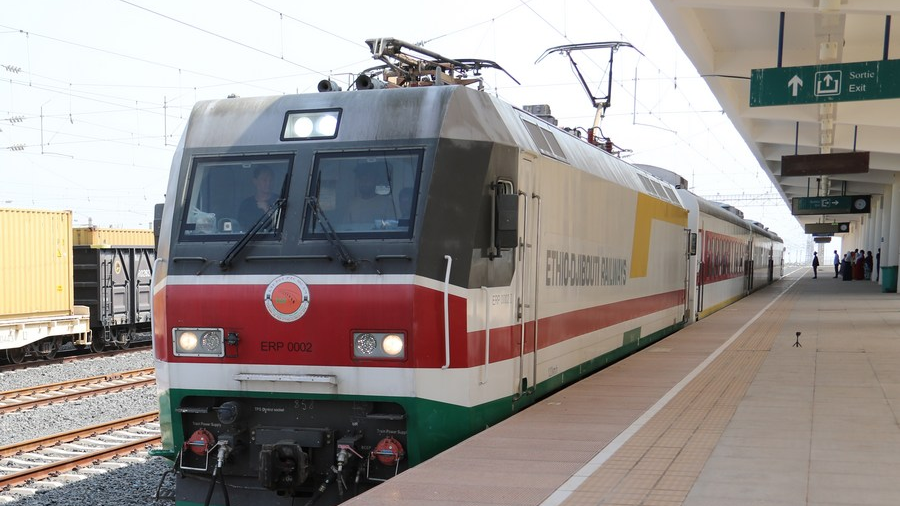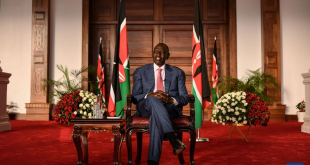Published: August 21,2024

It is known that China-Africa people-to-people exchanges have deep roots in history. But few people may know the intriguing story about “giraffe diplomacy.” It all started with the ocean voyages by Zheng He, one of the greatest navigators in China’s Ming Dynasty, who reached as far as East Africa. In the 1410s, Zheng He brought back a creature that had never been seen in China — an African giraffe. The Chinese assumed the giraffe was a unicorn, which according to tradition, meant the creature was blessed with immense wisdom and benevolence. This is how the gift of giraffe initiated early exchanges between the Chinese and African peoples.Since then, people-to-people ties between China and Africa have grown stronger, bringing the two peoples closer and injecting cultural vitality into China-Africa cooperation.The express train toward a better futureOsman, one of the first 24 students enrolled at the Djibouti Luban Workshop, had a childhood dream of becoming a railway worker. The Luban Workshop helped Osman’s dream come true. Set up in 2019, the workshop offers a three-year program including lessons on both engineering theories and practices. After graduation, Osman became an intern at the Addis Ababa-Djibouti Railway, the first China-built electrified railway in Africa.China first announced the plan of setting up Luban Workshops in Africa in 2018. Such workshops are named after the ancient Chinese inventorLu Ban, who was famous for his ingenuity and craftsmanship. Now some 2,500 years later, Luban Workshops have become a brand of Chinese vocational education in Africa.
As the old saying goes, “Give a man a fish and you feed him for a day. Teach him how to fish and you feed him for a lifetime.” At least 11 Luban Workshops have been established in 10 African countries, offering tailored courses to meet their development requirements. Up to now, Luban Workshops offer more than 70 majors in areas such as industrial robots, cloud computing, logistics management, traditional Chinese medicine, cross-border e-commerce and smart agriculture. Such professional training has equipped tens of thousands of young Africans such as Osman with skillsets fit for the fast-changing world, taking them on board the express train of China-Africa cooperation, but not just as passengers, but as qualified engineers and drivers who are able to earn a better future for themselves.Speak the same language
Nelson Mandela once said, “If you talk to a man in a language he understands, that goes to his head. If you talk to him in his own language, that goes to his heart.”
In recent years, as China’s investments in Africa grow, so has interest in the Chinese language across the continent.
Asha Fum Khamis is a Chinese language teacher from Tanzania’s University of Dar es Salaam. She has taught Chinese to more than 300 Tanzanian students, and about 50 of them later became Chinese language teachers as well. As China-Africa cooperation grows stronger in various fields, Chinese learning becomes more and more popular among young Africans in pursuit of development opportunities. Mandarin is increasingly featured on African school curricula.
Apart from African students learning Chinese, more and more Chinese universities are offering courses on African languages. From Zulu, Amharic, Malagasy to Somali and Tswana, over 20 African languages are now taught in Chinese universities, building the bridge of culture and friendship among the younger generations.
A Chinese proverb says: “To learn a foreign language is to have one more window from which to look at the world.” By learning each other’s languages, the cultural-linguistic ties between China and Africa have grown stronger and the hearts of the two peoples are getting closer.
A cultural feast
“My dream is yours. Your dream is mine. You want happiness. And so do I. We are all the same.” This is the lyric of the theme song of the documentary Africans in China, a documentary on stories of Africans living and working in China co-produced by Chinese and African directors.
The resonance in the feelings of the humanity lays the ground for cultural exchanges. In recent years, more and more African countries provide platforms for Chinese TV series and films to make a debut. From Memories of Peking, a TV show that has gone viral in Nigeria and Cote d’Ivoire, to Operation Red Sea, a Chinese box office hit that was filmed in the wilderness of Morocco, the flourishing China-Africa film and TV cooperation are telling stories of China and Africa in the new era.
The long history and cultural link between China and Africa also offer inspiration for film production. The TV drama Welcome to Milele was based on true stories of generations of Chinese doctors stationed in Africa, including the challenges and difficulties they faced and how they gradually bonded with the local people. The series was shot in six locations across China and Tanzania and will soon be aired in Africa.
In Africa, there is a term called “Ubuntu,” which believes in a bond of sharing that connects all humanity. The Chinese civilization also advocates the idea of harmony and sense of community. Such cultural similarities are the source of strength for China and Africa to enhance friendship and partnership. With Chinese and African youths joining hands, a bright future beckons for China and Africa.
Source: CGTN
 Africa -China Review Africa -China Cooperation and Transformation
Africa -China Review Africa -China Cooperation and Transformation
